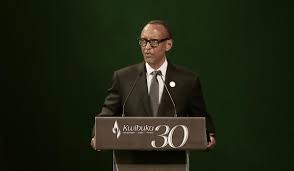The 1994 gnocide which claimed close to 1 million Rwandan Tutsis and moderate Hutus still conjures up strong emotions from victims, petpetrators and those who failed to act to prevent it.
Rwandan President Paul Kagame could not have put it any bluntly when he singled out the international community for failing his country in the darkest chapter of her history 30 years ago.
Addressing both former and current global leaders who had gathered in Kigali on Sunday to mark three decades since the massacre of over 800, 000 Tutsis and moderate Hutus by Hutu extremists in a 100-day pogrom, Mr Kagame did not mince his words.”Rwanda was completely humbled by the magnitude of our loss and the lessons we’ve learned are engraved in blood…it was the international community which failed all of us whether from contempt, or cowardice”.
Mr Kagame suggested that the world had watched with a mixture of disarming trepidation and indecision as Rwandans slaughtered their compatriots including those they had lived with as neighbours for many years.
He added: ”But the tremendous progress of our country is plain to see and it is a result of the choices we made together to ressurect together our nation. The foundation of everything is unity, that was the first choice, the belief, the idea of a reunited Rwanda and live accordingly. The second choice was to reverse the arrow of accountability, which used to point outwards beyond our borders. Now we are accountable to each other above all. Most importantly, we chose to think beyond the horizon of tragedy and become a people with a future. Today we also feel a particular gratitude to all the friends and representatives here with us from around the world”.
The Rwandan leader said Rwanda will be indebted to the survivors who were asked ”to do the impossible by carrying the burden of reconciliation on your shoulders and you continue to do so and continue to do the impossible”.
He singled out for praise late Tanzanian President Julius Nyerere for laying the foundation of the process which eventually brought the peace his country enjoys today and neigbouring Uganda and Dr Congo for playing what he called a unique role in hosting hundreds of thousands of refugees who had fled Rwanda in the wake of the massacres which began on April 7th 1994 and lasted until July of that year.
On Sunday, Mr Kagame and a host of foreign invitees had embarked on a wreath-laying ceremony at the Kigali Genocide Memorial, which is the site of a mass grave holding some 250,000 victims of the genocide.
A remembrance flame was also lit by Mr Kagame during the sombre ceremony which was attended by African leaders such as Cyril Ramaphosa of South Africa.
Meanwhile, the scar from the genocide still continues to haunt the conscience of the world especially for some invited foreign dignitaries who were in influential positions at the time of the Rwandan pogroms.
Among them is Bill Clinton, who was US president during this dark chapter of Rwandan history which he acknowledged was one of the most embarrassing foreign policy disasters of his administration.
Meanwhile President Emmanuel Macron, as the leader of France blamed his country and her allies for not summoning the political will which would have stopped the genocide and saved its people and the globe from the agony of its painful history which would remain a scar on the conscience of the world for posterity.
France had for years been accused by Rwanda under Kagame of indifference to the buildup to the genocide, which was triggered by the shooting down of President Juvenal Habyarimina’s plane over Kigali airport by suspected Tutsi militias.
The then French president François Mitterrand had close ties with Habyarimana’s Hutu-led government who soon went on a killing spree targeting Tutsis in an apparent retaliation for the latter’s death.
Despite repeated denials of aiding the genocide, a 2021 report from a French inquiry named France as a bearer of heavy responsibility for the 1994 atrocities.
The mass killing of Tutsi began on April 6th 1994 by Hutu extremists of the then Rwandan army who accused the rebel Rwanda Patriotic Forces of assassinating President Juvenal Habyarimana, a Hutu when his plane was blown from the skies over Kigali airport hours earlier.
Kigali became a killing field which soon spread to the rest of the country as radio propaganda encouraged the extremists Hutus which included civilians to hunt down and kill with guns and machetes Tutsis and other harbouring them.
The killing lasted for three months leaving close to 1 million people dead, and only ended when Mr Kagame’s RPF wrested control of Rwanda from the Hutu-led government later in 1994.
The RPF have denied reports of pursuing and killing Hutus in Rwanda and neighbouring DR Congo as repraisal attacks for the genocide of Tutsis.


